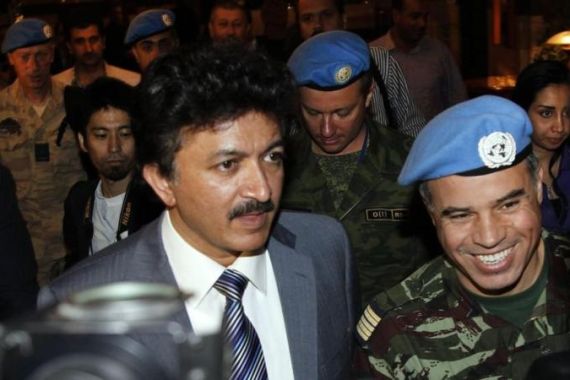The plague of war in Syria
With the rebels and government at near-stalemate, the country’s fate is likely to be more war and ‘Lebanonisation’.

New York, NY – The conflict in Syria has burned to a hurting stalemate, punctuated by barrages of cannon fire. It is likely to go on this way for some time.
Participants in the struggle are exhausted and hurt; many of the most willing are dead. The war and rebellion have undermined Syria’s international power and left it dependent upon Russia and an ever more isolated Iran.
Into this space moved the Annan plan, a putative cease fire, and the deployment of some UN monitors. Typically, such plans are conceived in terms of the “resolution” of the conflict, initiating a “process” leading to peace.
For the actors and parties to the conflict, such plans become part of the strategic terrain, to be played for survival and advantage. That is, peace plans are the conflict, a way of carrying on the war. The Palestinian struggle is a paradigmatic example. It has been conducted in and through a “peace process” for two decades.
Peace plans and war plans share a fatal assumption: war can be controlled, brought to a resolution, one that reflects some conception of what is right. That might be the victory of the righteous side (the one you are on), or democratic elections and a “peace and reconciliation process”.
But war plays many tricks on politics. The illusion that war is a space of potentially successful strategic action – where one might rationally achieve war aims (or peace aims) – is one of them.
It is too horrifying to consider that war may be a state of being, rather than an instrument of policy.
The conflict in Syria has realised precisely no-one’s aims or desires. It has dismantled Syrian society, economy and polity, and replaced them with suffering.
Nothing will ever be the same again.
This is most obviously so with the corpses strewn amid the rubble of many of Syria’s cities. But it is also so in the sense of the very order that comprised state and society in Syria, and in the taken for granted truths that governed the lives of Syrians. These are all now of the past.
The tragedy is that, in resorting to war, war wins. What the kind of conflict being in fought in Syria gets you is stalemate and “Lebanonisation”: a long term, many-sided conflict that admits no clear resolution.
The regime cannot entirely eradicate rebellious populations. The rebels cannot overthrow the regime.
There are only so many tanks and artillery batteries to shell towns and neighbourhoods. Men and equipment grow tired and need recuperation. Meanwhile, rebel bands living rough can do only so much, even with foreign supplied arms, while “terrorist cells” can blow things up, but achieve little else.
| Inside Syria: The slow Plan B for Syria |
Worse, war fragments both the regime and the opposition, and draws in or creates additional actors, more “sides” to the struggle.
Here, one has to appreciate war’s diabolical character. In these conditions, war is more than unwinnable. Various groups arise, and through arms, finance and influence come to play a role and have a voice. Each can gain control of only a dimension of power – a neighbourhood or city, an ethnic group or faction, a source of foreign patronage, command of a diaspora or of refugee camps.
We like to think that each “side” in a war represents some set of values, as if parties to a conflict were characters in a drama. Over here are the good guys, fighting for Free Syria, other there the bad ones, the regime and the “foreign terrorist groups”. In between them all are the innocent bystanders, the civilians.
But in fact it is organisation and power – however temporary and frail – that wages war. Rebel groups, state security bureaucracies, “terrorist” cells, even local neighbourhood militia are what wage war. While each has its own character, leadership and sources of support, all must remake themselves in the image of war if they are to fight and survive. They must become tough and brutal, willing to kill and die, and, above all, they must learn to sacrifice long term ideals for today’s realities.
War is a plague that wipes out the life that was and reduces all to the barest of levels.
As the Annan plan runs into the ground, there will be renewed calls for Western intervention, presumably in the form of air strikes. The likely outcome of such strikes will be to further entrench “Lebanonisation”. Without a substantial ground force, which the West will not provide and which the rebels lack, there will be no means of decisively defeating the regime.
Moreover, it is little appreciated in the West that the credibility of the rebel forces in Syria has already suffered gravely from their association with the West and its regional allies. Many see the rebels as little more than extensions of Saudi, Qatari, US and Western European policy.
So the rebels have the worst of all worlds. The “international community” talks peace and sends a few monitors; the West talks war and sends only small amounts of aid. The regime is gravely weakened but shows few signs of collapse. Even if it did collapse, continued civil war would be the likely outcome.
In other words, the war will continue.
Tarak Barkawi is Associate Professor in the Department of Politics, New School for Social Research.
